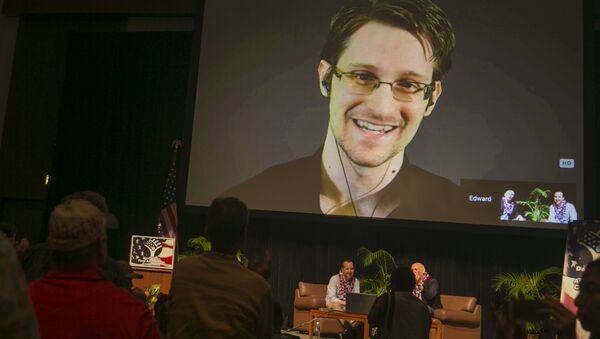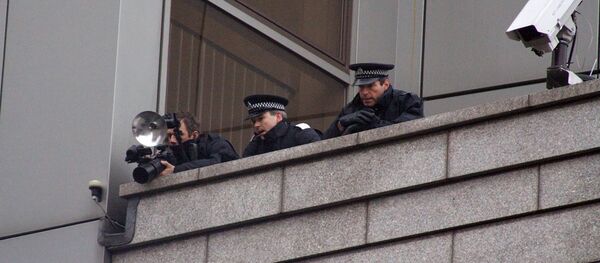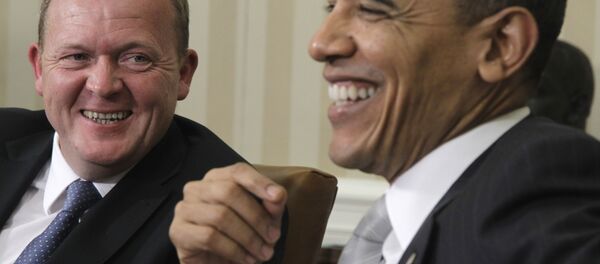In the interview, which arrives two-and-a-half years after Snowden's disclosure of the NSA’s mass surveillance tactics, he specifically dwelt on CIA torture, the Islamic State, and the issue of mass surveillance.
Interestingly, when asked about how he was doing at the beginning of the interview, Snowden said that it was not easy for him to answer the question.
Look at how well @Snowden has learned the tricks of the Kremlin-obsessed US press https://t.co/ECun3y9QVv pic.twitter.com/1fkWImHlhK
— Glenn Greenwald (@ggreenwald) 6 ноября 2015
Snowden said that he "can still communicate with anyone anywhere,” adding that the conditions of exile have changed in the modern-day world.
"It used to be, when people were pressed into exile, they'd lose their connections, they'd lose their significance, they'd lose their influence in the political debate…but technology is changing that. Exile as a strategy is beginning to fail," Snowden said.
1.CIA torture
Touching upon the revelations of CIA torture, Snowden said it is "really just crazy, the way that the US government has handled the issue of torture.' He pointed to "indications that there were people in the CIA who wanted to talk about these things, but who felt stressed."
"But instead of providing some path for these individuals to report the wrongdoings that they were witnessing, the CIA actually asked them to stop documenting the abuse," Snowden pointed out.
He blamed Washington for concealing wrongdoing, rather than actually trying to fix problems "even though the failure to do so could create a far greater, more long-term threat."
Focusing on foreign countries which host black sites and torture centers, Snowden said that the US had set a bad precedent for the whole world.
"These countries begin to think we're okay with that, these are things we're willing to do, because if America does it, it must be alright," he said, warning that "eventually it will come out, and you pay a moral cost."
"We actually spend money to shoot ourselves in the foot," Snowden added.
When asked why he thinks the rest of the world turns a blind eye to the issue, he said that it has been "legitimized by the threat of terrorism."
2. US drone strikes, Islamic State
Separately in the interview, Snowden commented on the so-called "Drone Papers": classified documents which have been leaked related to US drone strikes. Published by The Intercept in October, the documents revealed that nine out of ten people killed by drones were not the intended targets. In this regard, Snowden said that Washington does not target individuals with its drones, but rather phones.
"And they don't know whether the terrorist is holding the phone or whether his mother is holding it. And this is why so many drone strikes go wrong, why so many wedding parties get hit," he said.
According to Snowden, the US drone program "creates more terrorists than it kills.”
As far as Islamic State militants are concerned, he stressed that there was "no Islamic State until we started bombing these states."
"The biggest threat we face in the region was born from our own policies," Snowden said.
He pointed the finger at the US for "thinking on an emotional level, not a smart level," because it stages an "immediate response that doesn't make sense."
3. US mass surveillance
On the US mass surveillance tactics that made him a household name, Snowden said that even those who believe they have "nothing to hide" should be against the methods used by the US National Security Agency.
"It's not about not having something to hide; it's about having something to lose. What we lose when we're under observation is our humanity. What shapes us, what makes us individuals, is the fact that we can think, we can develop," he said.
"Rights in societies are collective, and individual. Rights are inherent to our nature, they’re not granted by governments, they’re guaranteed by governments. They’re protected by governments," Snowden said.
Touching on his whistleblower status, Snowden said that "being a whistleblower is not about who you are; it's about what you've seen."
"Whistleblowers are elected by circumstance, anybody can do it. It's about people who watch, who think, and who eventually respond," he said.
Snowden made global headlines in 2013 when he disclosed the US government’s covert mass surveillance program. He currently lives in Russia, which granted him asylum following Washington's threats to charged Snowden with espionage.






